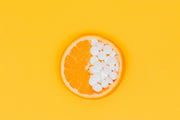
5 Most Common Nutrient Deficiencies In Women & How To Support Them
Did you know that compared to men, women have lower calorie requirements but higher nutrient requirements?
Nutrients are what gives us energy and allows our body to perform its basic functions. However, nutrient deficiencies in women are common and can contribute to hormonal and thyroid issues, menstruation issues, mood, energy and digestive issues among many other health conditions. In this blog, we delve into the science of nutrition and explore five essential nutrients that are commonly deficient in Australian women. Whether you're a seasoned wellness enthusiast or just beginning to prioritise your nutrition, everybody can benefit from learning about nutrients.
IRON
According to the World Health Organisation (WHO), iron deficiency is the top nutrient deficiency in the world. Feeling tired and constantly low in energy is the main symptom of iron deficiency. Women lose iron each month during their menstrual periods, which increases the risk of deficiency. Additionally, during pregnancy iron needs are higher, as well as for those on plant based diets.
Animal-based iron (heme) sources include red meat, eggs, sardines, mussels, and oysters. Plant-based iron (non-heme) is not as easily absorbed by the body as heme, but it is found in a variety of foods including beans and dark leafy greens. To maximise iron absorption, pair plant-based iron sources with foods high in Vitamin C like an orange, grapefruit, or the juice of a lemon or lime.
VITAMIN D
Even with plenty of sunshine, many Aussie women lack Vitamin D. This becomes even more prevalent in Winter, when we get less sun. Vitamin D is important for mood balance, immune health, bone health and hormonal health. Sun exposure, ideally 10-15 minutes per day with bare skin, is an effective natural source of Vitamin D. Additionally, dietary options include egg yolks, fatty fish like salmon, cod liver oil, and naturally vitamin D-enriched mushrooms.
MAGNESIUM
Magnesium is a powerhouse mineral, involved in 300+ body functions. Magnesium is important for most functions in the body from muscle and bone health, but also for brain and mood health. If you’re low in magnesium, you simply won’t be feeling your best. Unfortunately, our food's magnesium levels have dropped due to soil depletion. You can boost your intake with herbs, spices, cacao, leafy greens, nuts, and seeds into your diet as rich sources of this vital mineral.
CALCIUM
Calcium plays a vital role in heart health, muscle and nerve function, and strong bones and teeth. Surprisingly, 73% of Australian women don't get enough calcium from their diet. Calcium also plays an important role for women’s hormones, some studies suggest that adequate calcium intake may help alleviate premenstrual syndrome (PMS) symptoms. You can find calcium in foods like dairy, leafy greens, canned fish with bones, and chia seeds.
VITAMIN B6 (PYRIDOXINE)
Women are twice as likely to have an inadequate vitamin B6 intake than men, according to the Australian Bureau of Statistics. Vitamin B6 is important for hormonal regulation, brain health, sleep quality, and helps reduce premenstrual syndrome (PMS) symptoms. Our body cannot synthesise Vitamin B6, so it must be included in our diets. Dietary sources such as lean poultry (chicken and turkey), red meat, avocados, bananas, potatoes, and legumes are super important to include for vitamin B6.
A nutrient rich diet is important for our overall health and wellbeing and to reduce our risk of disease and illness. Do you think you could be deficient in any of these nutrients? Check in with your GP or nutritionist to organise blood testing to check your levels.
This nutritionist-approved chia seed pudding is a nutritional powerhouse! It contains 3 calcium rich ingredients: chia seeds, organic cacao & Calcium-fortified almond milk.
HERE'S WHAT YOU'LL NEED
- 1/4 cup chia seeds
- 1 tablespoon of cacao powder
- 1 tablespoons of maple syrup
- 1 cup calcium fortified almond milk (or regular dairy milk if not plant based)
- 2 tbsp of NH Thrive Chocolate Swirl Protein
- Fruit for toppings
HERE'S HOW TO MAKE IT
- Mix all ingredients in your desired container, set in the fridge for a few hours or overnight.
- Add your toppings and serve.

Immerse yourself in a swirl of rich chocolatey goodness. Our THRIVE Choc Swirl Plant Protein is a chocolate lover’s dream come true. A versatile and classic flavour you absolutely have to add to your plant protein collection! THRIVE is vegan, all natural, gluten-free & free from refined sugars. To make things even better, we've formulated our protein supplement with added superfoods, minerals and functional ingredients to promote a thriving, healthy body from the inside out.
SHOP THRIVE PLANT PROTEIN

By Breeanna Betar
Breeanna is a degree qualified Clinical Nutritionist specialising in women’s health. In her private clinic, she works one on one with women to help them achieve their health goals. Bree possesses a profound understanding of women’s health needs and is committed to sharing her knowledge with the Naked Harvest community, and is proud to be involved in Naked Harvest’s mission of revolutionising the active supplement industry.
![[Nav_Category_shop-all.jpg] SHOP ALL](http://www.nakedharvestsupplements.com/cdn/shop/files/Nav_Category_shop-all_medium.jpg?v=229551162107522660)
![[Nav_Category_protein.jpg] PLANT PROTEIN](http://www.nakedharvestsupplements.com/cdn/shop/files/Nav_Category_protein_medium.jpg?v=3001415470058422894)
![[Nav_Category_pre.jpg] NATURAL PRE-WORKOUT](http://www.nakedharvestsupplements.com/cdn/shop/files/Nav_Category_pre_medium.jpg?v=6814586239177681891)
![[Nav_Category_electrolytes_v2.jpg] ELECTROLYTES](http://www.nakedharvestsupplements.com/cdn/shop/files/Nav_Category_electrolytes_v2_medium.jpg?v=8085001776675848411)
![[Nav_Category_moonmylk.jpg] BEDTIME HOT CHOCOLATE](http://www.nakedharvestsupplements.com/cdn/shop/files/Nav_Category_moonmylk_medium.jpg?v=12631405938823957710)
![[Nav_Category_Creatine.jpg] CREATINE](http://www.nakedharvestsupplements.com/cdn/shop/files/Nav_Category_Creatine_medium.jpg?v=5379326253006347654)
![[Nav_Category_Matcha.jpg] MATCHA & CHAI](http://www.nakedharvestsupplements.com/cdn/shop/files/Nav_Category_Matcha_medium.jpg?v=12528052245834137118)
![[Nav_Category_wellness.jpg] GORGEOUS GREENS](http://www.nakedharvestsupplements.com/cdn/shop/files/Nav_Category_wellness_medium.jpg?v=12528176088121862281)
![[Collagen_category.jpg] COLLAGEN](http://www.nakedharvestsupplements.com/cdn/shop/files/Collagen_category_medium.jpg?v=7874986955741861029)
![[Nav_Category_onthego.jpg] ON-THE-GO](http://www.nakedharvestsupplements.com/cdn/shop/files/Nav_Category_onthego_medium.jpg?v=9258968730903582129)
![[Nav_Category_accessories.jpg] ACCESSORIES](http://www.nakedharvestsupplements.com/cdn/shop/files/Nav_Category_accessories_medium.jpg?v=8748347510610747858)
![[Nav_Category_samples.jpg] SAMPLES](http://www.nakedharvestsupplements.com/cdn/shop/files/Nav_Category_samples_medium.jpg?v=12269696752583776743)
![[Nav_Category_giftcard.jpg] GIFT CARDS](http://www.nakedharvestsupplements.com/cdn/shop/files/Nav_Category_giftcard_medium.jpg?v=1625935370118938582)
![[Nav_Category_pilates.jpg] Yoga/Pilates](http://www.nakedharvestsupplements.com/cdn/shop/files/Nav_Category_pilates_medium.jpg?v=13143021470193189408)
![[Nav_Category_high-intensity.jpg] High Intensity](http://www.nakedharvestsupplements.com/cdn/shop/files/Nav_Category_high-intensity_medium.jpg?v=1128519081117118136)
![[Nav_Category_low-intensity.jpg] Lifestyle](http://www.nakedharvestsupplements.com/cdn/shop/files/Nav_Category_low-intensity_medium.jpg?v=9882188842252146182)
![[Nav_Category_strength.jpg] Strength Training](http://www.nakedharvestsupplements.com/cdn/shop/files/Nav_Category_strength_medium.jpg?v=12070627897078322724)






